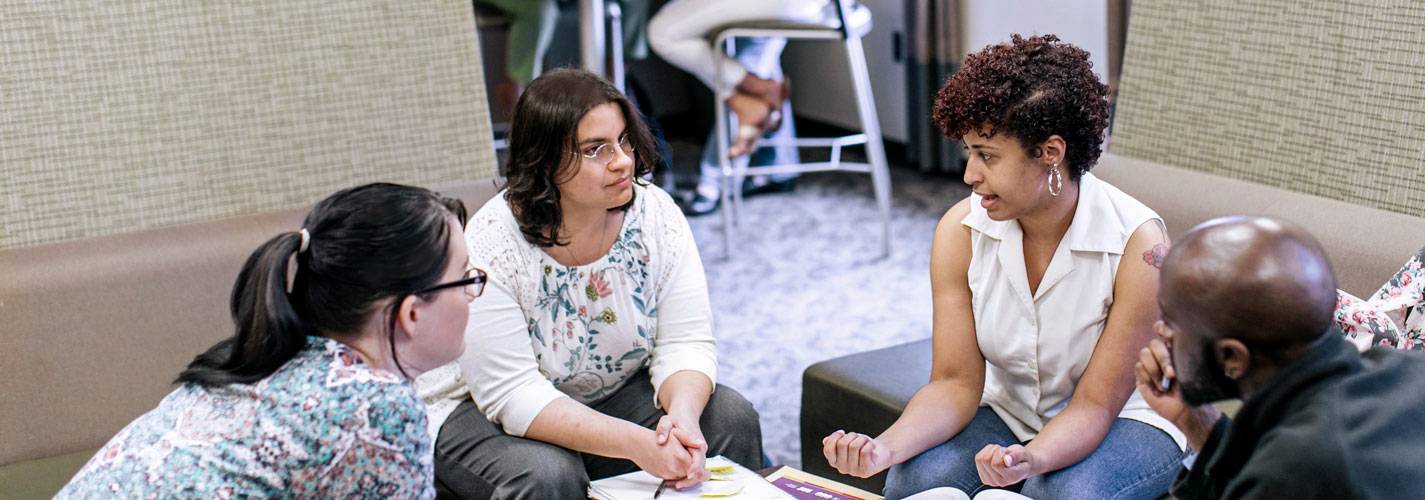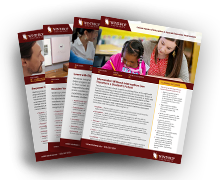Practicum Experience — interning in real, practice settings with direct supervision to apply theoretical and conceptual knowledge obtained in the classroom— is recognized by the CSWE as the signature pedagogy for social work education. Students receive hands-on learning opportunities in which they must demonstrate competency to ensure they are prepared for the many demands of social work practice.
You Learn in a Structured Format
The faculty at Winthrop take pride in their ability to form meaningful partnerships with agencies, helping facilitate educational practicum experiences for you. While it is understood that you will provide quality services that benefit the agency, your primary role is that of a student who is there to learn and develop social work practice skills. Accordingly, Winthrop faculty will train and oversee your practicum experience to help ensure you are able to meet all of your learning objectives.
Your Practicum Experience Meets CSWE Standards
Winthrop uses the CSWE Educational Policy and Accreditation Standards (EPAS) to establish practicum instruction course objectives. As such, the required practicum experiences are “… systematically designed, supervised, coordinated and evaluated based on criteria by which students demonstrate social work competencies.”
Gain Real World Experience to Prepare For Specialized Practice
Prior to beginning your practicum experience, you will work with a dedicated practicum / field placement specialist to identify practicum placements that meet the specific learning objectives of each practicum/field course.
- Field Instruction I (Generalist)
If you are in the traditional program, this is the start of your professional experience. During the practicum/field experience, you will apply foundational practice knowledge and skills for engaging, assessing, intervening, and evaluating clients and/or systems in a practicum/field practice setting. By the end of this course, you should be able to demonstrate generalist practice competence in the nine core objectives provided by CSWE. Field Instruction II (Specialized)
Advanced Standing students begin their practicum/field experience here. During this practicum/field experience, you will apply the knowledge and skills taught in the specialized empowerment courses. By the end of this experience, you will be able to demonstrate a beginning level of specialized practice competence.Field Instruction III (Specialized, Continued)
You continue to build on the development of specialized practice skills and by the end of this course, you demonstrate specialized-practice competence in all nine-course competencies in an independent manner. This illustrates your ability to enter the social work profession as an M.S.W. practitioner.
Prepare for the Realities of Practicum Education
The main benefit of practicum instruction is that you are able to apply what you are studying in your courses to real-life situations and develop skills for social work practice through professional experiences. To be effective, you will complete practicum instruction hours and coursework within the same semesters.
Maintaining the balance of family and social obligations with coursework is a challenge all students face. If you are also working full or part-time, you need to plan carefully to ensure coursework and practicum hours can be completed, so your investment of time and money, and the experience, is not compromised.
Practicum Hours
You will complete your practicum experience within the regular course of business hours: M-F between 8 a.m. and 5 p.m. Please talk with your current employer and affected family members at length about your hours, flexibility, and budget. To see your way to graduation day, you need to have a firm plan and support in place.
| Course | Weekly Hours | Total Practicum Hours |
|---|---|---|
| Field Instruction I —(Generalist — Traditional M.S.W. students only) | 12 hours/week | 240 hours over 21 weeks |
| Field Instruction II | 12 hours/week | 330 hours over 28 weeks |
| Field Instruction III | 12 hours/week | 330 hours over 28 weeks |
This is How You Succeed in Your M.S.W. Practicum Course
There are many steps between your graduate education and serving clients as a specialized M.S.W. practitioner — thankfully, the faculty at Winthrop help guide you through the process in an organized manner. To ensure you are ready to take on the challenge of the practicum experience, you and Winthrop's practicum faculty will work together to:
- Create a Learning Contract
This defines how the goals and competencies for your internship are translated into practice and learning tasks, and how you can complete the required practicum hours and achieve the course objectives. Find an Engaging Placement
Our practicum/field placement specialist works diligently to place students in the agencies of their choice or one that is compatible with their interests. While clinical placements are not always the appropriate learning environments for students, the specialist will work with you to ensure your internship can provide direct practice experiences with clients/systems. This allows you to build the skills of a specialized M.S.W. practitioner through a variety of learning activities and experiences.Establish Practicum Orientation
Just like any new position, you should not just be thrown into work. Your practicum placement specialist will work with you and the agency to ensure you understand the expectations for practicum instruction and are properly oriented to the agency, co-workers, clients, and the ins and outs of the day-to-day experiences.
Yes, You CAN Complete Your Practicum Experience at Your Current Place of Work
We are confident you can have a beneficial practicum experience at your current place of employment when these criteria are met:
- Your internship responsibilities must be different from your regular role.
- The specific academic requirements are met by your experiences.
- Your internship supervisor is someone other than your current work supervisor and has an M.S.W. degree.
A Special Note About Changing Placement Sites: A large benefit of practicum education is the breadth of experience you gain within the separate generalist and specialized placement opportunities. To enhance your ability to transfer skills, knowledge, and critical thinking from one practice setting to another, you are encouraged to complete your generalist and specialized practicum placements in two different agency settings.
If there is a compelling reason to have both practicum experiences within the same organization, and you can demonstrate how the agency setting will provide both generalist and specialized learning activities, you can request an exception from the Winthrop University practicum Director.
Find Out More Now
To learn more about Winthrop University’s online M.S.W. program and the practicum experience, contact a program manager toll-free at 833/257-1704 or request more information today!


 To download your free program brochure and learn more about Winthrop University’s online program, please complete the form below.
To download your free program brochure and learn more about Winthrop University’s online program, please complete the form below.